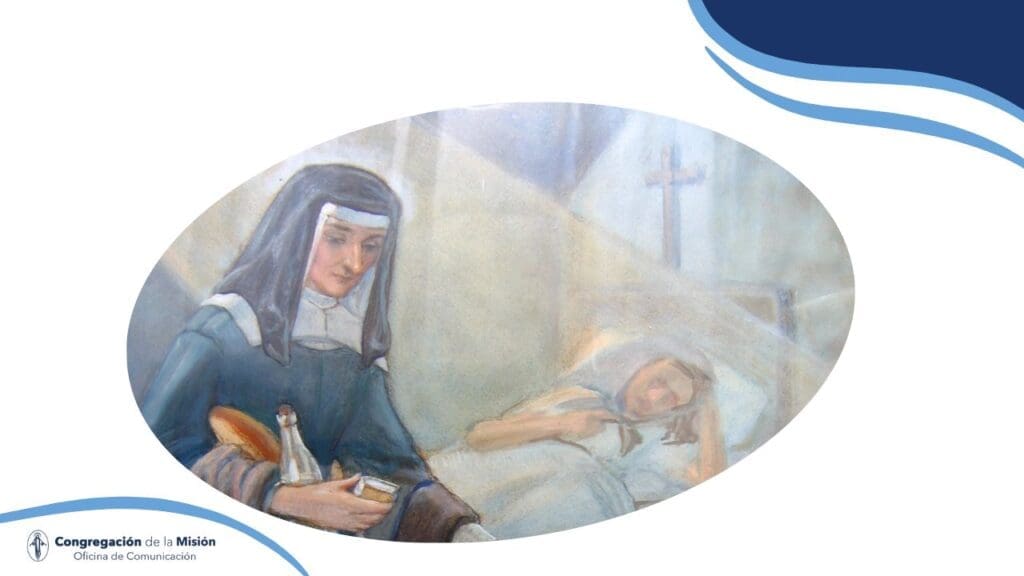
Louise de Marillac: resilient, empathetic and creative mother[1]
A few months after Luisa’s death, Vincent meets with the Daughters of Charity and tells them:
“What a beautiful picture God has set before your eyes! Yes, it is a picture to which you must look as a prototype to encourage you to do the same, to acquire that humility, that charity, that tolerance, that firmness in all your conduct, remembering how you tended in all things to conform your actions to those of Our Lord.” (SVP IX, 1235)
Today, as we celebrate her, this invitation is renewed for us. We are invited to fix our eyes on her who placed herself in the hands of the great artist who became a true work of art of charity.
Louise de Marillac, incarnating the Gospel, knew how to be a resilient, empathetic and creative mother. To do so, she had first of all to accept her vocation, which is a loving response to a loving call, because by loving “Love and we will come to conceive what is its duration, which in no way depends on us”. (E. 278)
She knew how to be a mother, but it seems that she never got to know her mother. Surely that reality made her suffer a lot. She affirms that she wrote:
“God has given me the grace to know that it is His will that I come to Him through the cross. Indeed, He willed that from my cradle I should be marked with it, leaving me almost never, in every period of my life, without occasion to suffer”. (E. 57)
Thus we can see that in the hands of the great artist, she became a true mother. For as John’s Gospel says, she was able to “go and bear fruit” (cf. 15:16). One of the most important facts of the encounter she had with Vincent was that he ordered her to “go”, to visit the charities and the poor. On these journeys, which were truly missionary, the character of a strong woman is forged in her, who goes out of herself and sets out to serve. And today this testimony of Luisa and the words of the Gospel resonate strongly for us, because it is always a challenge for the Christian to live the Christian life in outreach, in mission, in profound encounters that arise from a compassionate gaze that overcomes prejudices.
Louise became a mother by going out of herself to meet others, generating life in the encounters and thus truly being a model of resilience, because she decided to overcome the frustrations of life and set herself to serve. As James says: “faith without works is dead” (2:17). She was a woman of faith, united to Christ through faith, but at the same time embodying in everyday life the other theological virtues: hope and charity.
This resilient mother also knew how to be an empathetic mother. Being able to live a quiet and pious life, she once again “came out of herself” and gathered the first Daughters of Charity in her own home. And the sisters were able to find in her an empathetic mother. One of them says: “She was very charitable towards the sisters. She did her best not to leave anyone dissatisfied. This did not prevent her from reprimanding faults, but she always did it with great wisdom and love” (SVP IX, 1228). (SVP IX, 1228)
This resilient and empathetic mother was truly creative. St. Vincent said: “love is creative to infinity” (SVP XI, 65), and indeed Louise’s love for God and the poor was fruitful creativity. Starting with the organisation of the Confraternities of Charity and of the Sisters. She was a true innovator and executive. She was capable of renewing the consecrated life (the Daughters of Charity in that context were a novelty) and of innovating in the field of service to the poor, not being indifferent to any poverty of her time. She was the Tabitha of the 17th century, because she “devoted herself entirely to good works and to helping the needy” (Acts 9:36).
In this Eucharist let us ask, through the intercession of Saint Louise, that we too may be parents, life-giving, resilient, empathetic and creative people.
F. Hugo R. Sosa, CM
[1] The quotations of the founders are according to the Spanish version of the Collected Works of SVP and the Writings and Correspondences of SLM.

